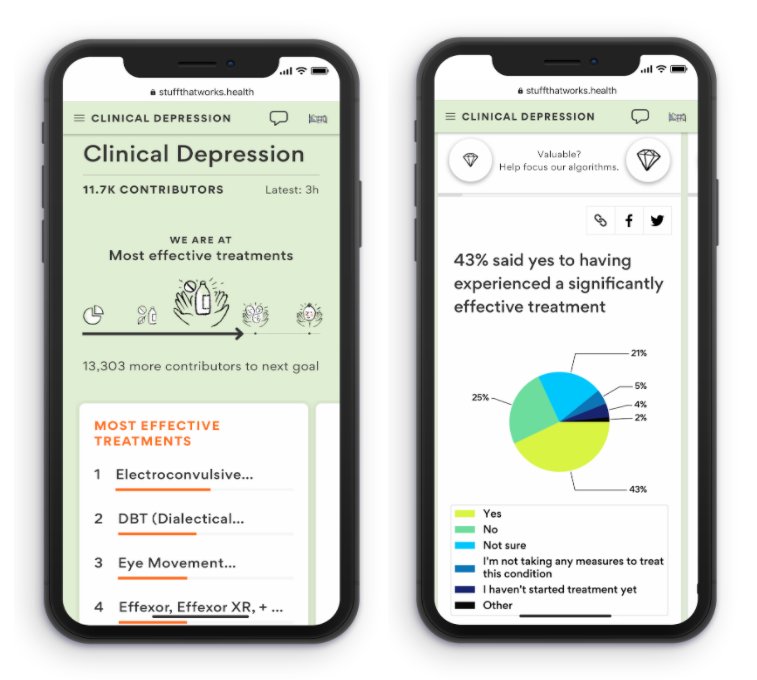Imagine what chronic illness research would look like if every person affected in the world was able to share their treatment experience as research-optimized data rather than threads upon threads of conversations? There’s no doubt that it would dramatically improve the medical’s world’s ability to minimize patient suffering by prescribing the treatments that are best suited for each individual.
For the nearly 45% of the world’s population suffering from one or more chronic health conditions – the drill is all too familiar: You see a doctor or specialist, often being dissatisfied with the level of improvement – you seek a second and even third opinion, then begin a trial-and-error process of prescribed treatments, only to come away still searching for a better option. For most, the next step is usually searching for other people’s experiences online in the hopes of finding something that may work better.
Millions of people share their personal treatment stories in online support groups but it’s an endless amount of text, with little background information and zero context – there’s really no way to make sense of it all.
Our goal at StuffThatWorks is to provide patients with a place to share their experiences, but in a comprehensive way that is optimized for analysis.
While you can connect with and support other community members — unlike other online health platforms, StuffThatWorks isn’t simply a forum for discussion, it’s a place to share information about each condition in a structured way, forming a database that’s constantly analyzed by using proprietary AI technology to transform the information shared into a personalized and structured knowledge database from which treatment effectiveness insights are generated. From the moment you join a StuffThatWorks condition community, you contribute over 1000 data points about your condition by completing the 60 questions survey about your condition and treatment experience. And that’s just the beginning. In the very near future, StuffThatWorks will enable sharing even more data including information from wearable devices, medical records, and more.
The idea is simple: Anyone can start a research community for their condition. The data is automatically analyzed in search of treatment effectiveness insights. The more contributors the more personalized the data becomes.
How it works:
The more contributors the smarter and more personalized the insights get. The data formed becomes available to everyone and is updated in real-time, along the process.
- Initially, no immediate information is available and the community focuses on inviting more people to share their experiences via sharing the survey.
- With only one hundred contributors, initial insights about the condition including age of onset, symptoms, aggravating factors and treatments can begin to be shared and browsed.
- At several hundred contributors, StuffThatWorks’ proprietary machine learning kicks in, and treatments can be ranked by level of effectiveness.
- Once thousands of people contribute, the system can predict the most effective treatments for both subgroups and individuals.
The more people participate and contribute to the data quality and the community, the more points they accrue, and the greater their influence on what will be researched next.

How big is it currently?
There are already 110 condition communities open on StuffThatWorks, with nearly 200,000 contributors sharing over 10 million shared data points and 150K experience-based content-rich pages all while in stealth mode. A new condition is added almost every single day.
What types of conditions are supported?
StuffThatWorks’ approach is relevant for almost all chronic conditions from the relatively common, such as diabetes and ADHD, but also rare and even orphan diseases that receive little attention and access to even fewer data. If the community for a particular condition hasn’t been created yet, anyone can open it within minutes and invite others to take the survey and contribute too. There are 5 cancer communities on StuffThatWorks in beta mode, the process is not yet automated.
Why we got started:
StuffThatWorks was co-founded by Yael Elish, former Waze founding team member and Head of Product. Elish spent years helping a family member cope with a medical condition that, while considered “mundane,” took a heavy toll on her and her family’s day to day life. Months of online research, driven by the belief that others, somewhere, must have experienced something similar, led to the discovery of a medical treatment that was more effective than what was prescribed. Similar to how Waze sought to empower people to know which route is best for them right now, here, too, crowdsourcing with massive participation can predict which treatment is best for which subgroup or individual at a given point in time.
How will it contribute to research?
StuffThatWorks data is what is called professionally, Patient Reported Outcome, or PRO in short. Until recently, research in the medical world was restricted mostly to clinical trials which are limited in the number of patients and conducted in a controlled environment. There is a massive interest in researching patients in a real world environment and PRO is one way of doing it. Until now, PRO research was also done in a limited way due to high costs. Enter StuffThatWorks and advanced crowdsourcing coupled with smart technology.
Why is it so hard to do?
The real world nature of our crowdsourcing approach is our biggest advantage, as well as our biggest challenge – the real world is not a lab-level cleanroom! When working with real peoples’ experiences, there are many hurdles to overcome – either conceptual or technical. What is the right way to think of symptoms as opposed to side-effects and comorbidities? How can we measure the effectiveness of the treatment when it is a part of a combination of treatments? And what about treatments that are used only after an overly long list of previous treatments? This blog is aimed at sharing our journey to tackle these challenges, to raise the questions about what we are trying to do here and to explain how the stuff StuffThatWorks is doing, actually works.
This blog will be co-written by us: Ron Held, I’m a mathematician, co-founder and CTO at StuffThatWorks, and Yossi Synett a physicist, co-founder and Chief Data Scientist at StuffThatWorks. We’ll focus on medical research and data science in the era of crowdsourcing. Feedback is welcome!
